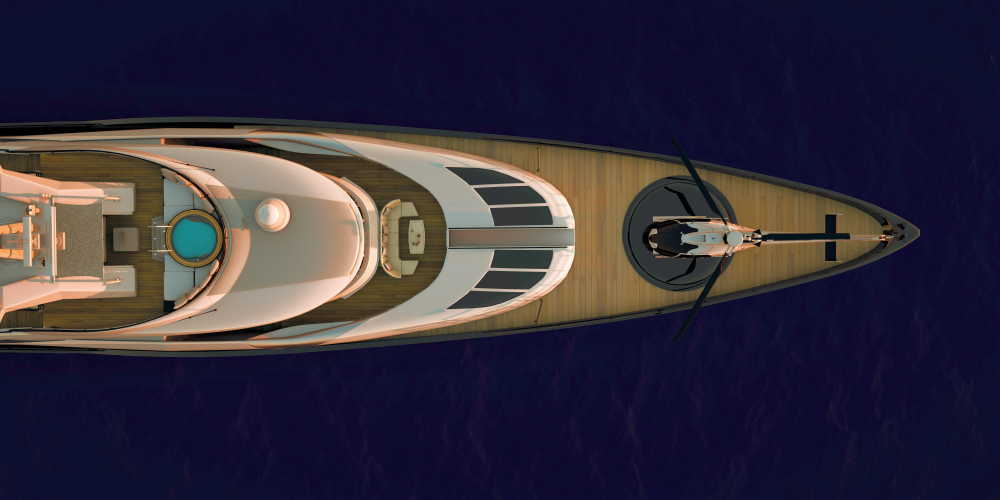Since the dawn of the superyacht in the early 20th century, the industry has been synonymous with opulence and grandeur—a reputation that rarely includes environmental considerations. But superyacht builders and buyers have not ignored Net Zero objectives. In fact, many builders are now channelling intense focus toward sustainable superyachts.
Traditional building practices are increasingly being replaced by eco-friendly alternatives, ranging from zero-emission propulsion systems to the use of recycled textiles onboard. The result? Superyacht owners in search of a ‘greener’ solution currently enjoy an abundance of sustainable choices.
In this article, we’ll explore how luxury superyacht builders seek to balance the pleasures of marine travel with planetary well-being.
Electric power
Battery-powered yachts, once a pipe dream, are now an enticing reality. Dutch yacht builder Feadship pioneered the use of electric power in the 83.5-metre Savannah, the world’s first fully electric and emission-free superyacht. By eliminating fossil fuels, electric power offers owners the dual benefits of silent cruising and a significantly smaller carbon footprint. Savannah uses Feadship’s Breathe propulsion system, which enables five different operation modes, from diesel and diesel-electric combinations to fully electric power. The yacht boasts a 30-tonne lithium-ion battery bank capable of holding a million watts of electricity.
Another hybrid superyacht, the 106-metre Oceanco creation Black Pearl, is one of the largest and most ecologically friendly sailing yachts in the world. She can cross the Atlantic without burning any fossil fuel thanks to her three 70-metre carbon masts on the world’s largest DynaRig sailing system and an innovative propulsion system that harvests kinetic energy when under sail.
Hydrogen power
Hydrogen power is another trailblazing technology that is gaining traction in the world of sustainable superyachts. Dutch firm Sinot Yacht & Architecture Design was responsible for the first hydrogen-powered yacht. Aqua is run entirely on liquid hydrogen stored in two 28-tonne vacuumed tanks, though backup diesel generators can power the vessel if needed. Four of the world’s largest builders are also developing hydrogen fuel cells for marine use: Lürssen, Baglietto, Tankoa, and Feadship.
Unlike gas-powered combustion engines, the only byproduct of hydrogen fuel is water. With no harmful outputs, hydrogen power seems like a dream come true—though there are challenges. Hydrogen power is currently behind diesel and electric motors in both output and efficiency, and safety concerns are still very real. Hydrogen is highly flammable, requiring massive speciality tanks for its storage that occupy a huge amount of interior space.
Sustainable superyacht design and interiors
Beyond alternative power sources, other sustainability initiatives in the superyacht industry extend to construction and design. Modern yachts are being built lighter and with more fuel-efficient design than their traditional counterparts, which minimises environmental impact for even diesel-powered engines. Optimised hull shapes and lightweight materials reduce drag and fuel consumption.
Recycled textiles used to create luxurious interiors are another key trend, as yacht owners resist the idea of sailing the oceans while surrounded by materials that contribute to its decline. Materials like hemp, cotton, and recovered ocean plastics are being transformed into high-end upholstery, curtains, and carpets.
The explorer yacht Yersin was constructed from 95% recyclable materials, including recyclable resin decks that substituted wood for a more sustainable alternative. Yersin’s ice-classed hull has been coated with a non-biocide silicon antifouling layer, while the yacht’s dynamic positioning minimises the impact of the anchor when dropped.
Clearly, superyacht builders are not shying away from the latent possibilities in sustainable construction. And where larger-scale vessels have led the way, smaller boats are sure to follow.
Protect your luxury assets
Taking care of your luxury assets is crucial to preserving their value and enhancing their worth. IQ-EQ’s specialist team creates bespoke holding and leasing structures as well as providing a comprehensive range of support services, from vessel registration to commercial chartering and other administrative concerns specific to yacht ownership.
Contact our specialist team to learn how we can support and protect your luxury assets.
You might also be interested in…






